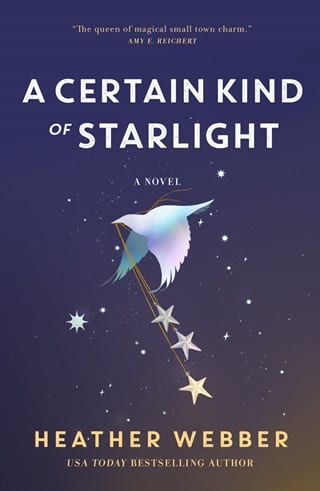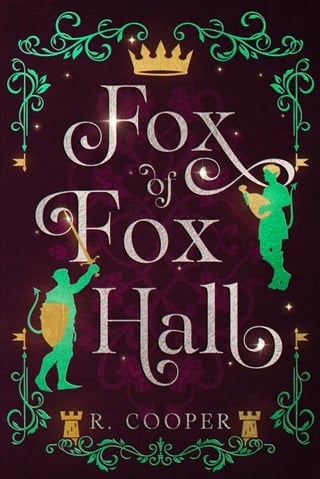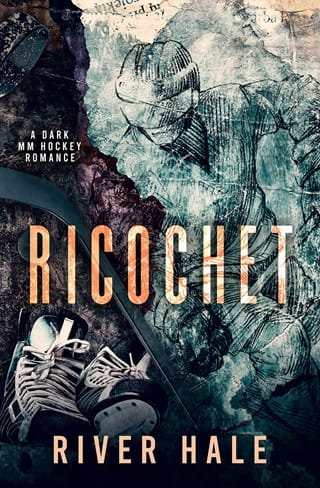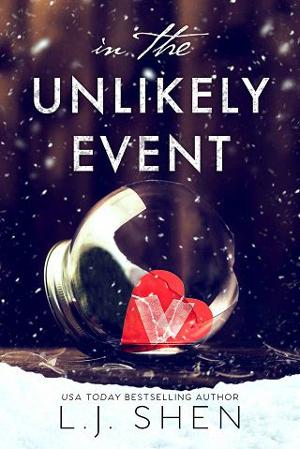Chapter Seven
CHAPTER SEVEN
From the Kitchen of Verbena Fullbright
If the butter and sugar for your batter are looking a mite curdled after creaming them together, they just need more time, so keep on mixin'. Trusting the process and staying the course will almost always get you where you're wanting to go.
Tessa Jane
Crisp blades of grass crunched under my feet early the next morning as I stepped off the back patio. By the sound of their excited chatter, Lucy and Ethel likely knew I would be arriving soon with their breakfast. Inside the house, Hambone howled in dismay at being left behind, but it was best to feed the ducks without his eagerness to help them finish their food.
Shimmery frost clung to branches, fence posts, the garden bench. There had been bursts of snow flurries throughout the night, but they'd come and gone without leaving much behind. Still, the forecasters hadn't backed down on their prediction that the area would see a couple of inches of snow on the ground by Sunday.
A pail banged against my thigh as I bypassed the shed and made my way across the backyard. Steam rose from the small pond in opaque wisps, and the tall grasses that surrounded it stood frozen in time, frosted in place. Behind me, the starlings sat on the farmhouse's roofline watching me, their iridescence quivering like an admonition in the dim light.
But that might've just been my imagination.
I'd given up on guessing why they were staying so close lately. It could be any number of things, honestly. Starting with my lingering shadow and Aunt Bean's heart troubles, then moving on to Ernie's fall, and now my grandfather's party, where he would undoubtedly remind me that he expected me to relinquish the starlight field when the time came.
So he could buy it.
Feeling a stab of guilt, I offered a weak hello to the starlings and carried on my way.
As I had every morning since I arrived in Starlight, I walked over to the back fence. I tried not to think about the other night when Ty had walked me to this very spot, gave me a nod, then turned and headed for the woods.
Or how I'd watched him walk away, his shoulders hunched with the weight of his troubles, his memories.
The old me would've stopped him from leaving and tried yet again to start a friendship—because for once, he'd given the impression he might be willing.
The new me, however, hadn't wanted to be hurt again.
So I let him go.
I shook my head, clearing him out of my thoughts. My breath puffed out in small clouds as I set the pail down and pulled myself up onto the lower fence rail to get a better look at the starlight crater in the distance.
I shoved my cold hands into my coat pockets as I scanned left to right, over the field, the pastures, the woods, and along the curve of the crater. Everything I could see was my and Addie's land. Our inheritance. Five hundred acres—a tiny fraction of which held the star wound, which was only a hundred and fifty feet in diameter.
The starlings trilled behind me, and I had the uneasy feeling they knew why I was assessing the land. The crater, especially.
I was looking for something specific. Something Abner Wingrove had written about in a poem all those years ago. In his journal, it had come after mentions of returning to the crater in search of another glowing diamond only to be thwarted by the bird.
'tis a spark
a twinkle
at daybreak
at first dark
a wink
a blink
the stone in reach
but for the screech
of the silver bird
'tis a spark
I interpreted the poem to mean he'd seen glimpses of glowing stones at dawn and dusk. Granddaddy interpreted it as Abner having had too much to drink. He didn't believe in the legend at all, though he liked to pretend he did. Mostly to build the buzz for when he bought the land and partly to annoy Aunt Bean.
In fact, he'd made it clear that he didn't think highly of Abner, either, and often poked fun at me for being intrigued by the journal. For caring about a man I'd never met.
Granddaddy didn't seem to have an empathic, understanding bone in his body. Not that I'd ever seen anyway. And I'd looked.
As I stood on the fence railing, the cool wind whipping my hair across my face, I tried to imagine the aftermath of the star falling. The chaos. The heartache of losing Clara. The wonder of the light. Charity's strength to carry on running the farm and to take care of her younger brother.
When my granddaddy spoke about reclaiming the land for the Wingrove family, he'd often rage about the Fullbrights, calling them brainless for not taking financial advantage of the starlight. I'd known, even from a young age, that the anger came from the fact that the Fullbrights hadn't needed to monetize the field to make ends meet. That they hadn't known poverty, like his daddy and most of the Wingroves before him. Like he had. Before Gigi.
I knew he believed that if Abner had kept the farmland in the first place, his own life wouldn't have known a moment's turmoil.
Which just showed how narrow-minded he could be.
As I hopped down from the fence, retrieved the pail, and made my way to the ducks, my thoughts turned to Granddaddy's party and how he was likely going to bring up his plans and what he expected of me.
It seemed like every time he talked about his ideas for the land surrounding the field, his plans expanded. It had started simply with entrance and parking fees. Then a lodge. Then a hotel. A resort. A waterpark.
It was impossible to ignore that all he saw when he looked at the starlight aurora were dollar signs. He cared little about the light and its clarity. Or that the Fullbrights felt like they were the guardians of something magical—something everyone should be able to experience for free.
Given Granddaddy's background he should appreciate that more than anyone, but he was too focused on what he coveted to be able to see the bigger picture.
Suddenly, Addie's voice echoed in my thoughts, telling me I could say no. She'd meant in reference to attending Granddaddy's party. But right now, I thought about all the times in my life I'd wanted to say no to him. But like I'd told her, it wasn't that easy. My grandfather was a steamroller of a man, always planning, always scheming.
According to my mama, my first words had been "Yes, sir," to him.
It was telling. I'd grown up thinking I'd never had a say-so. Not really. Honestly, I still felt that way most of the time. Mostly because voicing what I wanted, choosing what I wanted, remained out of my control.
Because of the Starling Society.
It was the secret network founded by my mama to protect victims of domestic violence.
Unknowingly, my grandmother had funded the society with her allowances to Mama and me, and if we wanted that money to keep rolling in by way of checks from my grandfather, I needed to toe the line when it came to appeasing him.
It was something I'd been doing ever since I was old enough to understand what was at stake. In my head, I could hear my mama saying, "Smile, Tessa Jane, and just do as you're told. Think of all the people who need our help."
So I pretended all was okay. That I didn't mind my life being mapped out for me, my career path chosen. That I didn't have an opinion. That I didn't mind giving up the starlight field when I turned twenty-five.
But now, in my current frame of mind, I couldn't help thinking about the person I'd been hurting by doing all that pretending: me.
Feeling all kinds of selfish, I sighed and pulled open the shed doors and Lucy and Ethel greeted me with loud quacks and excited flaps of their wings. They ran circles around me before darting into the yard, heading for the pond. I quickly filled their dishes, swept up, and replenished their straw. Aunt Bean had set up a portable heater in the shed that hung from the ceiling, but I was still chilled as I finished the chores, my grandfather's icy stare looming large in my mind. As I headed to the house, I kept my gaze down, away from the watchful eyes of the starlings.
When I reached the patio, I looked up and saw Addie's face framed in the glass of the back door. For the first time, I saw a light in my sister that I'd never seen before.
A welcoming light.
I wasn't at all sure what to make of the change in her. Or how to feel. The old me would've been jumping for joy at a truce, even an uneasy one, but right now I was more than a little apprehensive.
She opened the door before I reached it, and Hambone raced out and galloped toward the ducks.
"I have an idea," Addie said.
The kitchen smelled of coffee and wood smoke and the egg and hash brown casserole I'd made us for breakfast. I kicked my boots off by the door after I stepped inside, then hung my coat on a peg. It was quiet. Only us and the snoozing cats. Aunt Bean was already working, but our shift in the big red barn didn't start until nine thirty. Today Addie and I would be the faces of the Starling Cake Company, working directly with our customers, taking orders and payments through the barn's take-out window.
"An idea for Aunt Bean?" I asked.
"No, for you."
The sleeves of her sweatshirt were pushed to her elbows and her fingertips were water-wrinkled. Clean dishes drip-dried in the strainer next to the sink.
"About what?"
"About your grandfather's party. You need a fancy dress, right?"
I wasn't sure what I'd been expecting to hear but it wasn't that. I headed to the coffee pot, my emotions warring between wanting to let her into my life and wanting to keep her out. "Right."
"Well, I have a dress," she said. "You're welcome to borrow it if you like it."
Surprised, I nearly spilled coffee as I poured it into a mug. She was offering me something of hers? What was the catch? There had to be one.
Didn't there?
"It's fancy but not too fancy. It's old, but a classic design. It was bought during my Audrey Hepburn phase. It's been hanging in my closet here forever."
I got lost in the melodious sound of her voice for a moment, my heart calming, my body relaxing, as I added cream to the coffee and stirred. I hadn't seen much of my sister during her Audrey phase—which occurred during her senior year of high school—but remembered thinking her pixie haircut had beautifully suited the angles of her face.
Addie tugged down one sleeve, then the other. "I never wore it—so no one will know where you got it."
No one, meaning my grandfather. Obviously, she knew he'd probably keel over if he learned I was wearing a hand-me-down. "Why didn't you ever wear it?"
"It was for the senior homecoming dance, but I had a headache that day and had to skip."
There was pain in her voice. A story untold. For some reason I suspected it had nothing to do with a headache and everything to do with Sawyer and Ree.
Addie narrowed her gaze at my waist. "We might have to take it in a bit. Easy enough."
The darkness that loomed over me forced me to ask suspiciously, "Why?"
She seemed to immediately know what I meant. "Montgomery is nearly an hour away. The weather…"
Why did she suddenly care ?
What had caused this shift? Did she really think we could go from virtual strangers to sisters in a blink of an eye?
At the thought, I felt a tug deep down. A tug of longing . What she was offering me now was something I'd always wanted.
"It's midnight blue with a lace bodice. Three-quarter sleeves. Tea length. Do you want to see it?" she asked, folding her arms across her chest, as if bracing herself for rejection.
Seeing her start to close up again so soon after she'd begun to open up pulled at my heartstrings. For whatever reason, she was giving me a piece of herself. Could it really hurt to give a little in return?
With an inward sigh, I nodded.
The wooden stairs, dark with age, creaked as we climbed. At the top of the steps stretched a long hallway lined with a floral runner. Bean's and my bedrooms were on the right. The hall bath, Addie's bedroom—which looked the same as it had when she lived here—and the guest room were on the left. Family photos lined both sides of the hall. Smiling faces, all watching me much like the starlings had from the rooftop.
I glanced over all the photos, smiling at the image of me in a bassinet at the hospital not long after I was born. Then my gaze landed on one picture in particular and stayed there. It was a photo of my father, me, and Addie that had been taken by the local newspaper photographer at a school carnival when I had been in kindergarten and Addie in the fifth grade. After seeing the black-and-white picture in the paper, Bean had sweet-talked the photographer into giving her a full-color print.
In the photo, Addie and I flanked our father as he stood tall, with one hand resting on my shoulder, the other on Addie's shoulder. She leaned comfortably into him, her head pressed against his side. I stood awkwardly on my tiptoes as if trying to appear taller and my closed-lipped smile was slightly lopsided as I peered up at him instead of looking at the camera.
Daddy had been smiling with pride, the ever-present sparkle in his green eyes glittering. A knot formed in my throat—grief popping up, unwelcome yet familiar. I'd barely had a chance to get to know him. He'd died a few months after this picture was taken.
I studied myself in the photo, the sweet innocent girl who didn't understand the complexities of extramarital affairs and illegitimate children. The little girl who'd only wanted a big, loving, accepting family. Suddenly I wanted to cry, because nothing had changed.
I was still that girl.
"Feels like forever ago, doesn't it?" Addie had doubled back and now stood at my side.
"Yes," I said, my voice catching on all my emotions.
I heard her swallow. "Look how cute you were. I look like I had been rolling around in mud at recess." She leaned in a bit closer to the photo. "And this was taken only a week or two after I cut my own bangs right before one of my mama's rare visits. When she saw what I'd done, she pitched a hissy fit that I can still hear ringing in my ears if I listen hard enough."
Addie didn't usually say so much, so it was obvious she was trying hard to be nice. To be open. To be sisterly.
I still didn't understand why, but as I looked at the girl in the picture, I decided to stop questioning and just accept it for as long as it lasted.
"Your bangs are sweet." I let out a hollow laugh. "After this picture was published in the paper, and my grandfather saw it, Miss Pomona—the prominent pageant coach?—showed up at my house every weekday for four weeks. She schooled me on posture and posing and everything in between, including different ways to smile."
Addie's eyes widened and she gave a small shake of her head. "You were only five ."
"Never too young to learn," I said, mimicking my grandfather.
Sympathy floated in her eyes. "You lived in a whole other world at that house, didn't you?"
"It definitely feels that way sometimes." All of the time, actually.
She took a deep breath and shook her head. "I had no idea."
My shoulders stiffened, my jaw tightened. Of course she had no idea. She'd done her level best to ignore me for most of her life. And even though I knew why—because of her mama—it still hurt.
"I'm so sorry," she said, her eyes watery.
The apology caught me off guard and for some reason made me want to give her a hug. Instead, I wrapped my arms around myself, gave her a nod, and went back to looking at the photos.
We stood so close that our arms were touching yet neither of us stepped away. It felt a bit surreal, if I was being honest, because I could count on one hand how many times we'd actually touched in our lives, this moment included.
After a second of looking at the pictures, she said, "I'm so curious, I have to ask. How, exactly, is smiling taught?"
"Hours in front of a mirror to master a dozen different smiles."
" No ."
I nodded, then took a step back and flashed her six of them. Bright, affectionate, charming, mischievous, embarrassed, compassionate. I paused in between each one for dramatic effect.
Addie watched me closely, her sage-green eyes growing wide. "I don't know if I'm impressed or horrified. I'm leaning toward impressed."
She tried to copy the faces I'd made, which made me smile—a real smile. "I had a refresher course with Miss Pomona every spring right up until I moved away, and I have to admit the lessons have come in handy a time or two."
And Miss Pomona had been wonderful—loud and encouraging and colorful—but young children should be full of natural smiles, not practiced ones.
I turned back to the school carnival photo, this time my gaze focused on Addie. She really did look like she'd played in the mud that afternoon. She was absolutely filthy, her hair was a rat's nest, and her bangs were too short—though still adorable.
I noticed now, for the first time, that our eyes were the same. Not the appearance, of course, with her shape and color favoring our father, but the sadness in them.
We definitely came from different worlds, but both those worlds had been far from perfect.
"I wish I'd had more time with him," I said, not having to specify who I meant.
"Me, too."
We'd both lost so much when he died.
"Come and see the dress," Addie finally said on a sigh, breaking the thick silence. She faced me, smiled. "I think it'll be perfect for you."
There was something about her smile, about the gentle tone of her voice, that healed a tiny part of my broken heart. I swallowed over that lump in my throat. "Lead the way."
Outside, Hambone bayed. The ducks quacked. The starlings chattered.
And inside, as I followed Addie toward her bedroom, I swore I saw a flicker of light in my darkness.
 Fullepub
Fullepub 



